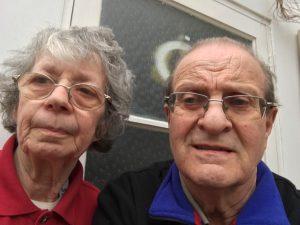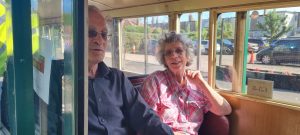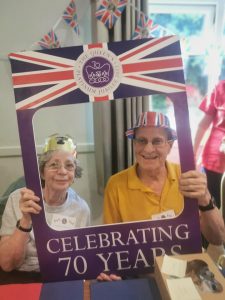
Brenda is a retired teacher, and I am a retired local government officer, led active lives prior to the COVID-19 pandemic. Brenda enjoyed attending dance and tai chi classes, assisting with archives at her former teacher training college, and her beloved hobby of bell ringing. She often participated in multiple activities in a day. When the pandemic hit, Brenda found ways to adapt and stay connected using Zoom, allowing her to continue dancing at home and engage with fellow bell ringers through virtual ringing rooms.
In July 2021, Brenda received a diagnosis of Dementia. Initially, she was in denial, attributing her symptoms to the natural aging process. However, over time, she cam e to recognize the gravity of the situation and adjusted her perspective. While understanding that the condition would not improve, she embraced the possibility of maintaining a good quality of life. We both realized the importance of taking a positive approach and engaging in suitable pastimes and activities to slow down the progression of the disease.
e to recognize the gravity of the situation and adjusted her perspective. While understanding that the condition would not improve, she embraced the possibility of maintaining a good quality of life. We both realized the importance of taking a positive approach and engaging in suitable pastimes and activities to slow down the progression of the disease.
Some of Brenda’s activities gradually resumed in 2021, albeit with restrictions. Although she had the ability to drive, we became cautious about unexpected events on the road, particularly during evening bell ringing sessions that often involved diverted traffic. To mitigate any potential problems, I started driving her to some of the ringing sessions and dancing classes, although attending all of them became impractical.
When Ross Mullis who is one of the Senior Dementia Coordinators at ADSS suggested that we attend a support group session at Temple Hill, Dartford, we had reservations about its suitability for us. However, we were pleasantly surprised to discover the benefits of interacting with others in more advanced stages of the condition. I attended the sessions with the intention of enduring them if it meant providing Brenda with a partial replacement for her lost activities.
Despite ongoing COVID-19 restrictions, we found ways to derive enjoyment and learn from others’ experiences during the support group sessions. When singing back the memories sessions started in Dartford, we decided to give them a try, despite my initial concerns about my singing ability. As restrictions eased, we found ourselves attending an average of 3-4 sessions per week, including a Memory Café, Chairfit, Carers Support, Peer Groups, and various one-off events and outings. Over time, Brenda chose to discontinue her bell ringing hobby and other previously attended activities.
We have deep appreciation and admiration for the staff and volunteers at ADSS, as they consistently demonstrate the following qualities:
The wide range of sessions and events not only caters to the diverse needs and capabilities of attendees but also provides a variety that encourages regular participation for individuals like us. The structured nature of the sessions helps those with Dementia feel at ease, and Brenda looks forward to the weekly schedule, always having at least one event to anticipate in the slightly longer term. Moreover, the friendships we have formed with fellow attendees have become invaluable, including a group of us visiting a café on the premises for lunch during one of the sessions. These connections contribute significantly to our overall quality of life.
In addition to Brenda’s adjustment to her condition and the importance of her continued engagement, it is crucial for others to recognize and include individuals with Dementia. For me, it means exercising patience, occasional gentle persistence, and striving to maintain a sense of normalcy in our daily lives. It’s essential to remember that Brenda can still engage in conversat ions, albeit with occasional repetitions, and it is our responsibility to foster inclusive interactions.
ions, albeit with occasional repetitions, and it is our responsibility to foster inclusive interactions.
It is crucial to emphasize the importance of inclusivity and not excluding people with dementia. We should strive to create an inclusive society where individuals living with dementia are fully embraced and engaged. The genuine and unwavering love an 8-year-old granddaughter shows while playing with her granny serves as a powerful reminder that we should all try to interact with and support individuals with Dementia. There should be no excuses for others to shy away from connecting with those affected by this condition.
Sign up to receive our email updates
By submitting this form I agree to the ADSS privacy policy, details of which can be found here
Contact Us
Alzheimer’s and Dementia is a registered charity in England and Wales (1173379). A company limited by guarantee and registered charity in England and Wales (10690071). Registered address: Safeharbour, Coldharbour Road, Northfleet, Kent DA11 8AE
Follow us on social media